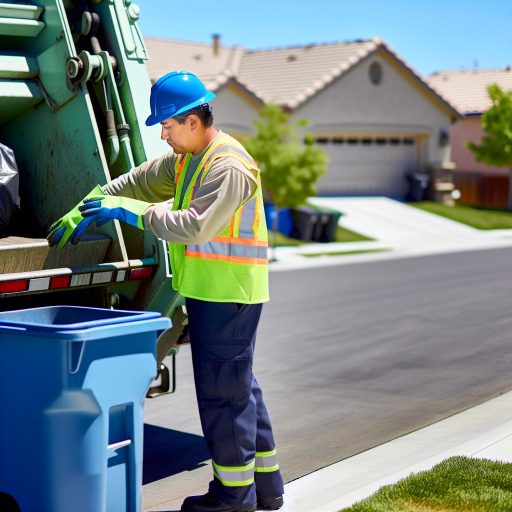Introduction:
Waste management workers play a crucial role in keeping cities clean.
From collection to disposal, waste management ensures proper sanitation.
Cities rely on waste management to prevent environmental hazards.
Without waste management, cities would face health risks.
Overall, waste management workers contribute significantly to improving urban quality of life.
Waste management workers play a vital role in keeping our cities clean and safe.
They have a variety of responsibilities that help to ensure that waste is properly disposed of and recycled.
Responsibilities of waste management workers:
- Collection of garbage and recycling: Waste management workers are responsible for collecting garbage and recyclable materials from homes, businesses, and public spaces.
- Sorting and separating waste: Once the waste is collected, workers sort and separate it into different categories such as plastic, glass, paper, and organic waste.
- Handling hazardous materials: Waste management workers are trained to safely handle hazardous materials like chemicals, batteries, and electronic waste to prevent environmental contamination.
By diligently carrying out these responsibilities, waste management workers play a crucial role in maintaining the cleanliness and hygiene of our cities.
One of the key tasks of waste management workers is the collection of garbage and recycling materials.
They follow designated routes to pick up waste from bins, dumpsters, and other collection points.
This helps to prevent littering and ensures that waste is disposed of properly.
After collecting waste, workers transport it to sorting facilities where they separate recyclable materials from non-recyclable ones.
This process is essential for maximizing the amount of waste that can be recycled and reducing the amount that ends up in landfills.
Sorting and separating waste require attention to detail and the ability to identify different types of materials.
Workers use special equipment like conveyor belts, magnets, and screens to efficiently sort through the waste and divert it to the appropriate processing areas.
Handling hazardous materials is a critical aspect of waste management that requires specialized training and expertise.
Hazardous materials pose a threat to the environment and public health if not handled properly.
Waste management workers follow strict safety protocols to manage hazardous materials safely and prevent accidents.
Proper disposal of hazardous materials involves storing them in designated containers, labeling them correctly, and transporting them to specialized facilities for treatment or disposal.
By safely managing hazardous materials, waste management workers help to protect our environment and prevent pollution.
Transform Your Career Today
Unlock a personalized career strategy that drives real results. Get tailored advice and a roadmap designed just for you.
Start NowIn addition to their day-to-day responsibilities, waste management workers also participate in public education and outreach programs to raise awareness about waste reduction, recycling, and proper disposal practices.
They engage with the community to promote sustainable waste management practices and encourage residents to recycle and compost.
Waste management workers play a crucial role in keeping our cities clean and sustainable.
Through their dedication and hard work, they help to preserve the environment, protect public health, and create a more livable and healthy community for everyone.
When it comes to keeping cities clean, waste management workers play a crucial role in ensuring that our environment remains free of trash and debris.
These dedicated individuals work tirelessly to collect, transport, and dispose of waste in a safe and efficient manner.
Tools and equipment used by waste management workers:
- Garbage trucks: Waste management workers rely on garbage trucks to collect and transport trash from residential and commercial areas to disposal sites. These trucks come in various sizes and capacities to accommodate different types of waste.
- Recycling bins: In addition to collecting regular trash, waste management workers also use recycling bins to separate recyclable materials such as paper, plastic, glass, and metal. These bins help promote sustainability and reduce the amount of waste that ends up in landfills.
- Personal protective equipment: Safety is of utmost importance for waste management workers, who often handle hazardous materials and sharp objects. They use personal protective equipment such as gloves, masks, and safety goggles to protect themselves from injuries and exposure to harmful substances.
By having the right tools and equipment at their disposal, waste management workers are able to efficiently and effectively carry out their duties.
These essential resources enable them to maintain cleanliness in our cities, promote recycling initiatives, and ensure the well-being of both the environment and the community.
Find Out More: Daily Routine of a Construction Worker: A Detailed Look
Challenges faced by waste management workers:
Waste management workers face various challenges in their daily tasks.
These challenges include physical demands, exposure to hazards, and illegal dumping issues.
- Physical demands of the job
- Exposure to bacteria and toxins
- Dealing with illegal dumping
Physical demands of the job:
Waste management workers have to lift heavy trash bags and bins daily, leading to physical strain.
They are constantly on their feet, walking long distances to collect garbage from households and businesses.
The repetitive nature of the job can cause injuries such as back pain, strains, and sprains.
Exposure to bacteria and toxins:
Waste management workers come into contact with all kinds of waste, including hazardous materials.
Exposure to bacteria from rotting organic waste can lead to illnesses such as gastroenteritis.
Handling toxic chemicals and substances puts them at risk of long-term health issues.
Dealing with illegal dumping:
Waste management workers often encounter illegally dumped waste in public areas.
Cleaning up illegal dumping sites is not only time-consuming but also poses safety risks.
Showcase Your Business Today
Reach thousands of readers actively exploring professional services. Publish your business profile and grow your audience now.
Publish NowThey have to navigate through potentially dangerous materials while cleaning up these areas.
Uncover the Details: How to Start Your Own Tile Setting Business from Scratch
Innovations in waste management:
– Use of technology for efficiency
– Implementation of recycling programs
– Composting initiatives
Use of Technology for Efficiency
Waste management workers have embraced technology to make their jobs more efficient.
One of the main technologies used is GPS tracking systems on their vehicles.
This allows them to optimize their routes and pick-up schedules, reducing fuel consumption and emissions.
Additionally, sensors are installed in waste bins to monitor their fill levels.
This data helps workers prioritize collections and avoid overflowing bins.
Implementation of Recycling Programs
Another key innovation in waste management is the implementation of comprehensive recycling programs.
These programs aim to divert recyclable materials away from landfills and towards recycling facilities.
Waste management workers play a crucial role in educating residents about recycling practices.
They ensure that recyclables are properly sorted and collected.
By increasing recycling rates, cities can reduce their environmental impact.
They create a more sustainable waste management system.
Composting Initiatives
Composting is an increasingly popular practice in waste management.
Many cities are implementing composting initiatives to reduce organic waste.
Waste management workers collect food scraps and yard waste separately from other trash.
These materials are then sent to composting facilities.
They are transformed into nutrient-rich compost that can be used to enrich soil.
By diverting organic waste from landfills, cities can reduce methane emissions.
They create valuable resources for agriculture.
Discover More: Adapting to Changes in the Mining Industry

Impact of Waste Management Workers on Public Health
Waste management workers play a crucial role in keeping cities clean and maintaining public health.
- Prevention of disease spread
- Reduction of pollution
- Contribution to a clean environment
Waste management workers are the frontline defense against the spread of diseases in urban areas.
By collecting, sorting, and disposing of waste properly, they help prevent the breeding of pests and the accumulation of harmful bacteria.
Furthermore, these workers contribute significantly to reducing pollution levels in cities.
By ensuring that waste is collected and disposed of in a controlled manner, they prevent harmful chemicals and toxins from contaminating the air, water, and soil.
Additionally, waste management workers play a vital role in creating a clean and aesthetically pleasing environment for residents.
By keeping streets, parks, and public spaces free of litter and debris, they help improve the overall quality of life in a city.
Their hard work and dedication are essential for the well-being of urban communities.
Uncover the Details: Ironworkers and Their Contribution to Infrastructure
Public Perception and Appreciation of Waste Management Workers
Waste management workers play a crucial role in keeping our cities clean and healthy.
Yet their efforts are often overlooked and undervalued by the general public.
It’s important for us to recognize the hard work that these individuals put in day in and day out.
This ensures that our communities remain free of waste and debris.
Importance of Recognizing Their Hard Work
The work of waste management workers is physically demanding and often goes unnoticed by the majority of the population.
These individuals are responsible for collecting, sorting, and disposing of waste in a safe and efficient manner.
Showcase Your Business Today
Reach thousands of readers actively exploring professional services. Publish your business profile and grow your audience now.
Publish NowThis helps to protect our environment and public health.
By acknowledging and appreciating the efforts of waste management workers, we show our gratitude.
They provide a vital service to our communities.
Recognizing their hard work can also help to improve morale and job satisfaction among these essential workers.
Ways to Show Gratitude and Support
- Thank You Notes: Taking the time to write a simple thank you note or letter expressing your appreciation can go a long way in showing your support for waste management workers.
- Public Recognition: Encouraging local authorities to publicly recognize the hard work of waste management workers through awards, ceremonies, or social media shoutouts can help raise awareness about their contributions.
- Volunteer: Consider volunteering with a local cleanup or waste management initiative to show your support for these workers and contribute to a cleaner environment.
- Advocate for Fair Wages: Support efforts to ensure that waste management workers receive fair wages and benefits for their labor, advocating for better working conditions and job security.
- Spread Awareness: Educate others about the important role that waste management workers play in keeping our cities clean and encourage them to show their appreciation as well.
By showing our gratitude and support for waste management workers, we can help to improve their working conditions.
We can raise public awareness about the importance of their work.
Finally, we can foster a culture of respect and appreciation for these essential members of our communities.
Waste management workers play a crucial role in keeping our cities clean and safe.
First, they are responsible for collecting and disposing of waste from households, businesses, and public areas.
They work tirelessly to ensure that trash is removed efficiently and in a sanitary manner.
Waste management workers also play a key role in recycling efforts, sorting materials and diverting them from landfills.
They are on the front lines of environmental conservation, promoting sustainability through their work.
Importance of Recognizing Their Work
In conclusion, waste management workers are unsung heroes who work diligently to keep our cities clean.
It is important to acknowledge and appreciate their hard work and dedication to the community.
As a call to action, let us strive for better waste management practices and show our support for these essential workers.
Additional Resources
Texas Minimum Construction Standards
[E-Books for Sale]
The Big Book of 500 High-Paying Jobs in America: Unlock Your Earning Potential
$19.99 • 500 High-Paying Jobs • 330 pages
Explore 500 high-paying jobs in America and learn how to boost your career, earn more, and achieve success!
See All 500 High-Paying Jobs of this E-Book
1001 Professions Without a Degree: High-Paying American Jobs You Can Start Now
$19.99 • 1001 Professions Without a Degree • 174 pages
Discover 1001 high-paying jobs without a degree! Unlock career tips, skills, and success strategies for just $19.99!




